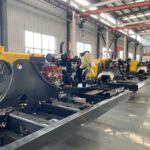Introduction
Best Wheel Loader for Farm: Enhancing Efficiency and Productivity.As the agricultural industry continues to evolve, farmers are constantly seeking advanced machinery to streamline their operations. A crucial piece of equipment that significantly contributes to farm efficiency and productivity is the wheel loader. In this article, we will explore the best wheel loaders available in the market today, highlighting their features, benefits, and applications. Whether you’re a small-scale farmer or a large agricultural enterprise, investing in the right wheel loader can revolutionize your farm operations.
Table of Contents
- Introduction
- Understanding the Role of Wheel Loaders
- Key Factors to Consider When Choosing a Wheel Loader
- Comparing Features and Performance
- Benefits of Using Wheel Loaders on the Farm
- Maintenance and Care Tips for Wheel Loaders
- Conclusion
- FAQs
Understanding the Role of Wheel Loaders

Wheel loaders play a crucial role in modern farming operations, revolutionizing the way materials are handled and transported on the farm. These heavy equipment machines are specifically designed for efficient material handling tasks. With their robust construction and powerful hydraulic systems, wheel loaders are capable of lifting, moving, and loading various types of materials with ease.
One of the primary functions of wheel loaders on the farm is loading and unloading materials such as feed, hay, fertilizer, and grain. The large bucket attached to the front of the loader allows for quick and efficient loading onto trucks or trailers. This significantly reduces manual labor and saves valuable time, enabling farmers to focus on other important tasks.
Moreover, wheel loaders are highly versatile machines that can be used for a wide range of applications on the farm. They can clear land by removing rocks, debris, and vegetation, preparing the ground for planting or construction projects. Additionally, wheel loaders can assist in light grading work, ensuring a smooth and level surface for optimal farm operations.
The maneuverability of wheel loaders is another key aspect that makes them indispensable on farms. These machines are designed to navigate through various terrains and tight spaces, allowing farmers to access hard-to-reach areas without difficulty. Whether it’s maneuvering around barns, storage facilities, or narrow pathways, wheel loaders offer exceptional agility, enhancing overall operational efficiency.
In addition to their material handling capabilities, wheel loaders also contribute to farm safety. Modern wheel loaders are equipped with advanced safety features, including improved visibility from the operator’s cab, backup cameras, and alarms to alert operators to potential hazards. These safety measures help prevent accidents and ensure the well-being of both operators and other farm personnel.
Key Factors to Consider When Choosing a Wheel Loader
When selecting the right wheel loader for your farm, there are several key factors that you should consider. By evaluating these factors, you can ensure that you choose a wheel loader that best meets your specific needs and maximizes your farm’s productivity and efficiency.
First and foremost, the size and capacity of the wheel loader are crucial considerations. Assess the scale of your farm operations and the typical loads you handle to determine the appropriate size of the machine. A larger farm with heavy-duty material handling requirements may require a wheel loader with a higher lifting capacity, while a smaller farm might benefit from a more compact and nimble option.
Maneuverability is another important factor to take into account. Evaluate the layout of your farm, including narrow spaces, tight corners, and uneven terrains. A wheel loader with excellent maneuverability can navigate these areas smoothly, ensuring efficient operation and minimizing any potential damage to crops, structures, or equipment.
Power and efficiency are key considerations as well. Look for a wheel loader with a suitable engine power output that can handle the tasks you require. Additionally, consider the fuel efficiency of the machine to minimize operating costs and reduce your farm’s environmental impact. Opting for a wheel loader with advanced engine technologies and optimized hydraulic systems can help achieve a balance between power and fuel consumption.
Attachments compatibility is another factor to keep in mind. Determine whether the wheel loader can accommodate various attachments such as forks, grapples, buckets, or snowplows. The ability to easily switch between attachments expands the functionality of the machine, allowing you to perform a wider range of tasks with a single piece of equipment.
Comparing Features and Performance
When comparing the features and performance of different wheel loaders, it’s important to assess various aspects that directly impact their functionality and suitability for your farm. By evaluating these factors, you can make an informed decision and choose the wheel loader that best aligns with your specific requirements.
One crucial aspect to consider is the lifting capacity of the wheel loader. This refers to the maximum weight the machine can lift and carry. Depending on the nature of your farm operations, you’ll need to determine the appropriate lifting capacity that can handle your typical loads efficiently. It’s essential to choose a wheel loader with a lifting capacity that matches your farm’s requirements to ensure optimal performance.
Engine power and fuel consumption are additional factors to evaluate. The engine power determines the machine’s ability to handle heavy loads and operate effectively in various conditions. Look for a wheel loader with a powerful engine that can deliver the necessary torque and speed for your farm tasks. At the same time, consider the fuel consumption of the machine to minimize operational costs and reduce environmental impact. Opting for a wheel loader with advanced engine technologies and fuel-efficient systems can provide a balance between performance and efficiency.
The type of transmission and its speed options are also worth considering. Different wheel loaders may have varying transmission types, such as automatic or manual. Assess the transmission system and the available speed options to ensure they align with your farm’s requirements. A smooth and responsive transmission can enhance maneuverability and overall productivity.
Bucket size and compatibility with attachments are important considerations, especially if you anticipate using the wheel loader for various tasks. Evaluate the size of the bucket and assess whether it can accommodate the materials you typically handle on your farm. Additionally, check if the wheel loader supports different attachments, such as forks, grapples, or buckets of various types. This versatility allows you to expand the machine’s functionality and adapt it to different farm tasks as needed.
Operator comfort features contribute to the overall efficiency and productivity of the wheel loader. Look for models that offer a comfortable and ergonomic cab design, with adjustable seating, controls, and excellent visibility. Operator fatigue can be minimized with features like climate control systems and reduced noise levels. Prioritizing operator comfort ensures a more productive and enjoyable working environment.
Benefits of Using Wheel Loaders on the Farm
Utilizing wheel loaders on the farm offers a multitude of benefits that contribute to increased efficiency, productivity, and overall success in agricultural operations. These powerful machines bring forth numerous advantages that make them indispensable equipment on farms of all sizes.
One of the primary benefits of using wheel loaders is the significant improvement in material handling tasks. These machines excel at loading and unloading various materials, such as feed, fertilizer, hay, and grain. With their large buckets and hydraulic controls, wheel loaders can swiftly and efficiently move heavy loads, reducing the need for manual labor and saving valuable time. This enhanced efficiency enables farmers to streamline their operations, allocate resources effectively, and focus on other critical aspects of their farm tasks.
The versatility of wheel loaders is another key advantage. These machines can be used for a wide range of applications on the farm. Whether it’s transporting materials from one location to another, clearing land for new projects, or assisting in light grading work, wheel loaders prove to be invaluable assets. Their ability to handle diverse tasks reduces the reliance on multiple pieces of machinery and streamlines farm operations, resulting in improved productivity and cost-effectiveness.
Time and labor savings are significant benefits derived from using wheel loaders on the farm. With their impressive lifting capacity and agility, wheel loaders expedite tasks that would otherwise require manual labor or multiple workers. The efficiency of these machines reduces the time spent on material handling, allowing farmers to allocate their resources more effectively. By automating and mechanizing tasks, wheel loaders contribute to labor savings, enabling farmers to accomplish more within the same time frame and potentially reducing labor costs in the long run.
Furthermore, wheel loaders play a crucial role in enhancing farm safety. Modern wheel loaders are equipped with advanced safety features and ergonomic designs that prioritize the well-being of operators and other farm personnel. Features such as excellent visibility, operator comfort, and stability control systems minimize the risk of accidents and injuries. By ensuring a safe working environment, wheel loaders help safeguard the health and safety of farm workers, improving overall farm operations and maintaining a positive work culture.
Maintenance and Care Tips for Wheel Loaders

Proper maintenance and care of wheel loaders are essential to ensure their longevity, optimal performance, and reliability on the farm. By following these maintenance and care tips, farmers can maximize the lifespan of their wheel loaders and minimize the risk of unexpected breakdowns or costly repairs.
Regular inspection and cleaning are vital aspects of wheel loader maintenance. Farmers should regularly inspect the machine for any signs of wear, damage, or loose components. This includes checking the tires, hydraulic lines, filters, and fluid levels. Cleaning the wheel loader, both externally and internally, is also important to remove dirt, debris, and any contaminants that may affect the performance and longevity of the machine.
Adhering to the manufacturer’s recommended maintenance schedule is crucial. This includes routine tasks such as oil changes, filter replacements, and lubrication of moving parts. Following the specified intervals and using high-quality lubricants and filters will ensure that the wheel loader operates smoothly and efficiently.
Proper training for operators is another key aspect of maintenance and care. Operators should receive comprehensive training on the safe and correct operation of the wheel loader. They should be familiar with the machine’s controls, safety features, and proper handling techniques. Well-trained operators are less likely to cause unnecessary wear and tear or engage in unsafe practices that could damage the machine or pose a risk to themselves and others.
Conclusion
Investing in the best wheel loader for your farm can revolutionize your operations, enhancing efficiency, productivity, and safety. By carefully considering your specific needs and comparing the available models, you can select a wheel loader that aligns with your farm’s requirements. Remember to prioritize factors such as size, capacity, maneuverability, and attachments compatibility to maximize the benefits of this versatile equipment.
FAQs
- Are wheel loaders suitable for all farm sizes?
- Yes, wheel loaders come in various sizes to accommodate different farm sizes and requirements.
- What attachments can be used with wheel loaders?
- Wheel loaders can be equipped with various attachments, including forks, grapples, buckets, snowplows, and more.
- How do wheel loaders contribute to time and labor savings?
- Wheel loaders can handle heavy loads efficiently, reducing the need for manual labor and saving time in material handling tasks.
- What safety precautions should be followed when operating a wheel loader?
- Operators should wear appropriate safety gear, undergo training, and adhere to safety protocols to prevent accidents.
- Can wheel loaders be used for tasks other than material handling?
- Yes, wheel loaders can perform additional tasks such as land clearing, light grading, and assisting in construction projects.






-150x150.webp)
